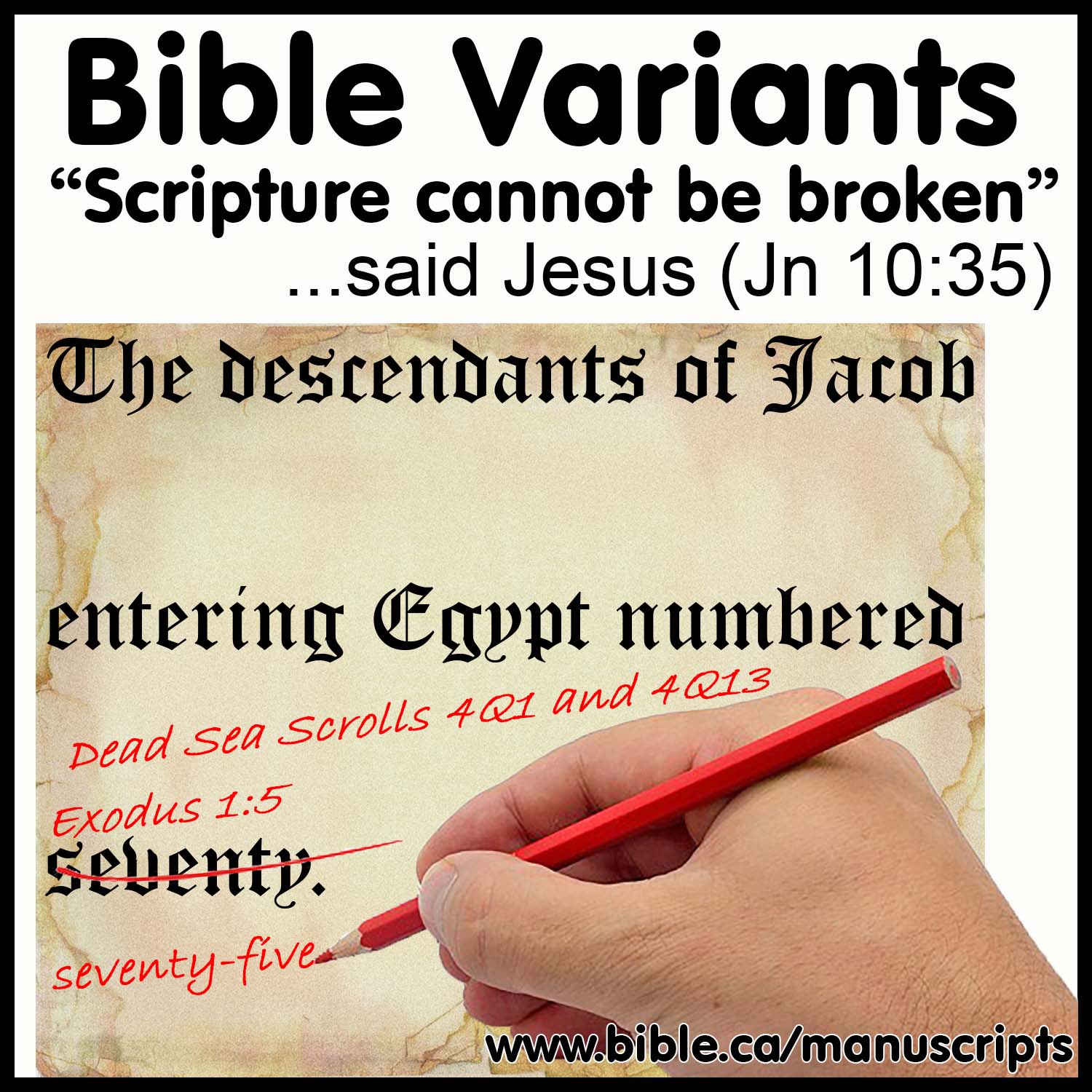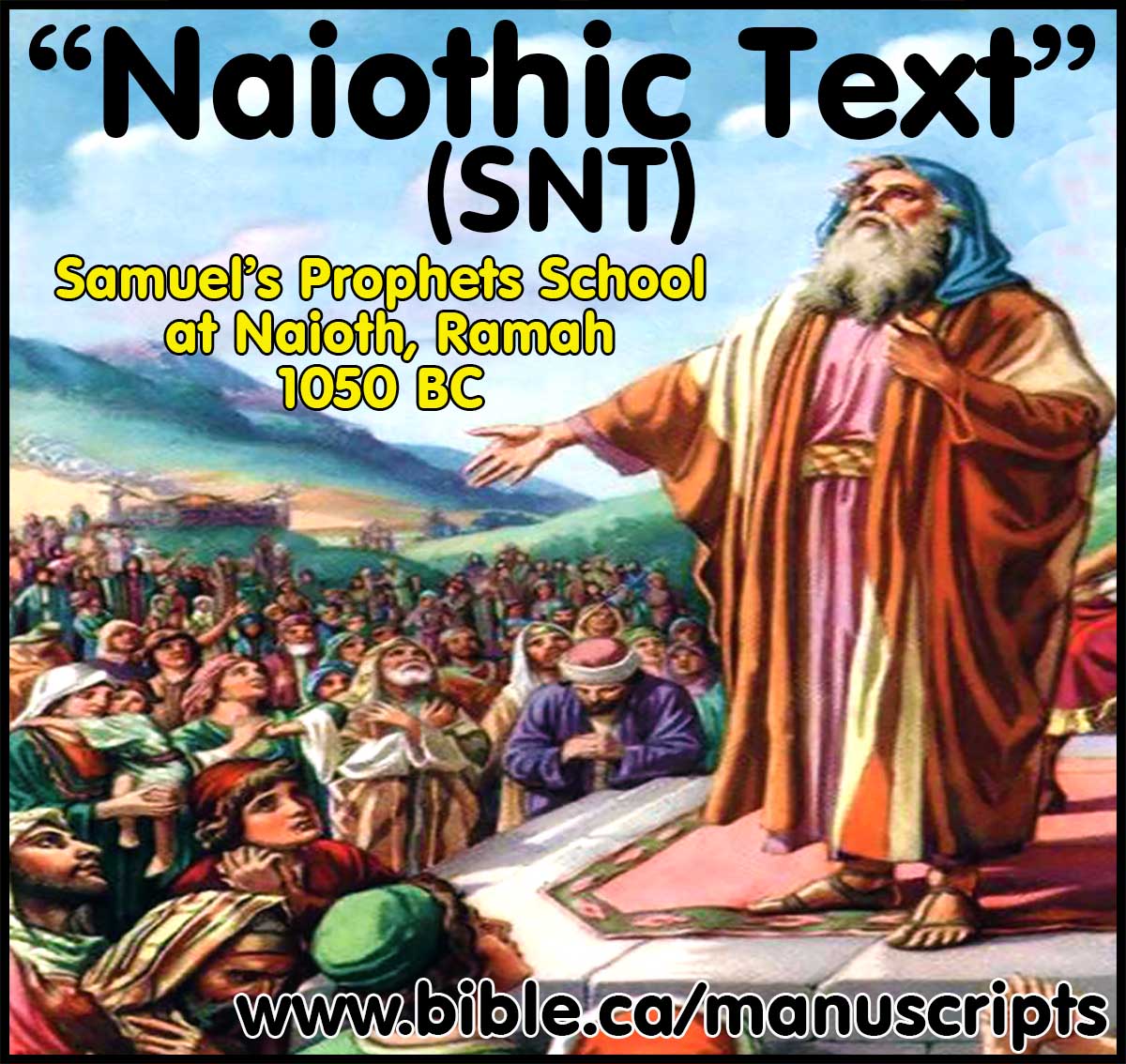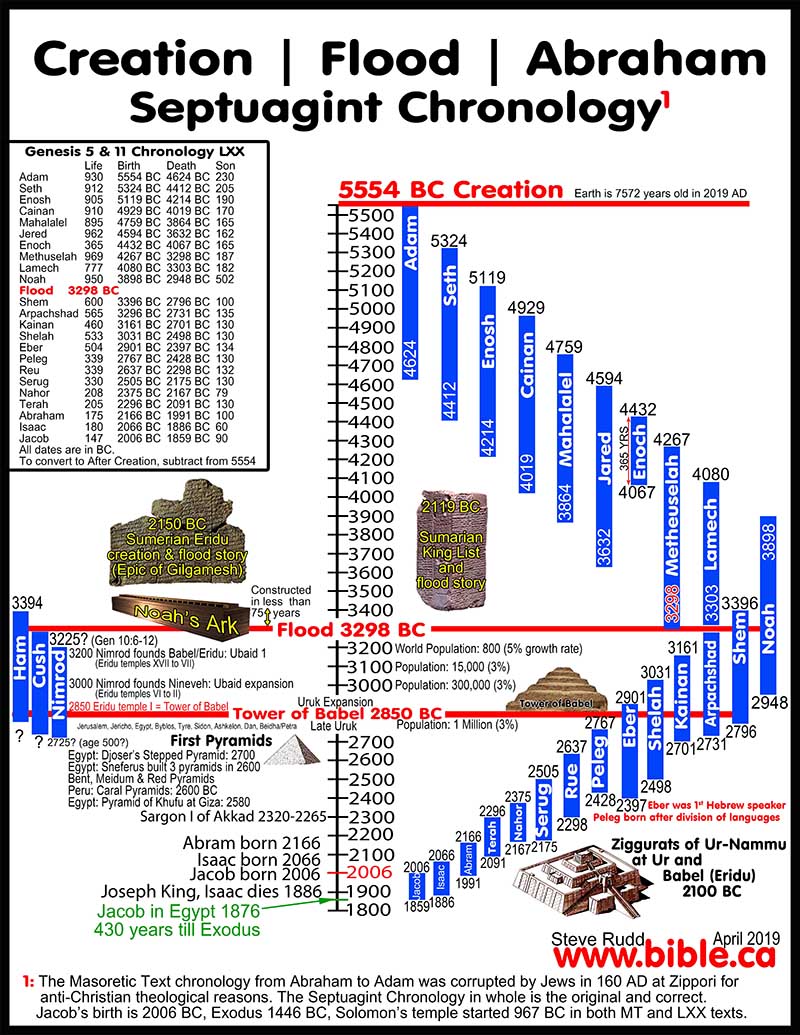|
Textual Variants in the Book of Job "Scripture cannot be broken" (Jesus, John 10:35) "My word will accomplish what I desire and succeed in the purpose for which I sent it." (Isa 55:11) Steve Rudd November 2017 |
Textual Variants in the Book of Job:
Bible textual variants analysed
Introduction:
The book of Job is 400 lines shorter in the Septuagint than the Masoretic because of the translation process that sought to simplify the Oriental poetic style text into a “Cole’s Notes” dynamic equivalent for a target Greek audience. However, the additional words of Job’s wife (Job 2:9a,9b,9c, 9d, LXX) found in the Septuagint but absent in the Masoretic are a different matter altogether and likely represent a scribal addition (gloss). To everyone who reads the story in the Masoretic Text, Job’s wife simply didn’t say enough to satisfy human curiosity, but that’s how the Holy Spirit may have left it. The single statement of Job’s wife in the Masoretic Text might be viewed as “test bait” to “abide within the word of God” that some ancient Hebrew scribe (possibly Ezra) found irresistible and added the words after he “snapped” under the midnight full moon. Perhaps the words of Job’s wife were added as part of a Greek pubic theatre play in the margin of the text and later scribes assumed they were part of the autograph. On the other hand, the additional words of Job’s wife may be the original and they are removed by the Jews in their great corruption of the Tanakh in 160 AD. In the end we simply do not know why or where the additional words of Job wife originate. What we do know is that they existed at the time Job was translated into Greek before 150 BC. However, the scribal gloss addition/note added to the ending of Job 42:17,17a-17e in the LXX is very instructive and helpful. Job 42:17a-e is clearly a scribal note NOT intended to be considered scripture by the fact that it references “the Syriac book” for information. This is gloss is quite helpful and gives us great insight into how the Septuagint translators knowingly mixed scripture with commentary. While the modern reader finds their methods unacceptable because there are no demarcations between the sacred and human words, the translators did not consider these glosses and additions to be scripture and somehow expected their reads to understand this. The Septuagint translators therefore viewed these glosses and additions, including several complete apocryphal books, the same way Christians view the Bible maps, comments and notes throughout their “Study Bible”.
Discussion:
1. The text of the book of Job we use today generally follows the Masoretic Text (MT) which is viewed as superior and closer to the original than the Septuagint (LXX) Greek translation of Job.
a. The book of Job in the Masoretic Text (MT) is longer than the Septuagint (LXX) by 400 lines and contains many unique and unusual words and phrases.
b. However, all the differences make zero difference in the overall message and theme of the book of Job.
2. Various theories as to why the MT differs from the LXX in the book of Job:
a. Perhaps, like the book of Jeremiah, there two different original manuscripts of Job in use at the same time.
b. Perhaps Job was used in liturgy of responsive singing: Perhaps the book was expanded to include repetitious sentences etc. and used in responsive acapella singing in the same way the Song of the Sabbath Service, Daniel 3:49–93 Apocrypha LXX or from the ancient Jewish songbook Psalm 145:1-7, 12-21 from Dead Sea Scroll 11Q5.
c. Perhaps the book of Job was originally written in Aramaic or Arabic and LXX translators abridged the repetitive phrases and simply skipped sections that were difficult to translate.
d. Perhaps there was a single Hebrew original copy of Job and the LXX translators abridged the book by removing repetitive phrases and ignored difficult to translate sections.
3. Gloss Addition: The rebuke of Job’s wife: Job 2:9a,9b,9c, 9d LXX
a. Notice the additional words of Job’s wife in the Septuagint are not found in the Hebrew Masoretic text and date back to the original translation in 282 BC.
b. No Dead Sea scrolls from Job chapters 1-7 have been found, so we cannot verify or deny that the world were not in the Hebrew Bible in the first century.
c. However, the fact these words are in the LXX indicate that this gloss predated the first century and represent an ancient tradition.
d. “Even if the translated text of the Book of Job is shorter than the original, it contains additions or even extensions. A vivid example is that of Job's wife whose painful words intend to exhort her husband to curse God (2: 9-10). The Hebrew text contains just one verse. The translation of the passage (which I have already cited) presents a more extended text. In this instance, it is the translator himself who is overflowing with human indignation.” (The Book of Job introductory text, Codex Sinaiticus Graecus 3, G. Galavaris, K. Belezos, E. Pappa, p 19, 2002 AD)
e. To everyone who reads the story, Job’s wife simply didn’t say enough to satisfy human curiosity, but that’s how the Holy Spirit left it. The single statement of Job’s wife might be viewed as “test bait” to “abide within the word of God” that some ancient scribe found irresistible and added the words after he “snapped” under the midnight full moon. Perhaps the words were added as part of a Greek pubic theatre play in the margin of the text and later scribes assumed they were part of the autograph. In the end we simply do not know why or where the additional words of Job wife originate. What we do know is that they existed at the time Job was translated into Greek before 150 BC.
f. “In ancient times a wife looked to her husband for her identity in the community and for her financial security. If Job had lost everything, so had she. The LXX, which assigns to her a longer speech, calls attention to her deep sense of loss and her conclusion that Job is to blame. Some commentators have characterized her as “Satan’s tool” (John Calvin) spared by the tempter in order to use her in this way against Job (Thomas Aquinas). Others have seen her in the stereotype of “woman as temptress” found in many biblical stories (Eve, Delilah, Jezebel, etc.). It is true that she echoes the Satan’s words, “Curse God and die!” But she also echoes the words of God, marveling that Job was still holding on to (his) integrity. With these words she reveals that she believes Job has obviously wronged God, and it is only a matter of time before his inevitable demise. It is therefore foolish to continue to practice piety since it obviously will yield no blessing in the face of their great loss. What she is suggesting is a form of theological euthanasia—suicide by cursing God. If there is anger in her voice there may also be pity and wish for a merciful end to the whole ordeal. The words of Job’s wife anticipate the conclusion about Job that the friends will reach: Job suffers because he has sinned. Her words also anticipate the great sense of alienation that Job will feel when rejected by his friends and peers. Her suggestion that Job “curse God” only heightens the invitation for Job to abandon his piety and disavow God.” (NICOT, S. M. Hooks, Job 2:9, 2006 AD)
g.
The Text of the Septuagint: Job 2:7-10. [Additional words of Job’s wife in green italic]
2:7 So the devil went out from the Lord and struck Job by grievous sores
from foot to head.
2:8 And he took a potsherd in order to scrape the pus and sat on the
dunghill outside the city.
2:9 And after much time had passed, his wife said to him, “⌊How long⌋ will you wait, saying,
2:9a ‘Behold, I wait for just a little time to receive the hope of my
deliverance?’
2:9b For behold, your memory has been
removed from the earth, sons and daughters of my womb, pangs and labors that ⌊for no purpose⌋ I
labored with hardship.
2:9c And you? You seat yourself among
the decay of worms to pass the night in the open air.
2:9d And I am being led astray and am
a servant wandering from place to place and from house to house, welcoming the
sun when it sets in order that I might stop my labors and pains that now come
to me.
2:9 Now say some word to the Lord and die!”
2:10 But looking up he said to her, “You speak like one of the foolish
women. If we accept good things from the hand of the Lord, shall we not endure
evil things?” In all these things that happened to him, in no way did Job sin
by his speaking before God.
h. Muslim/Islamic tradition of Job’s wife in the Koran: Beat her 100 times with a stick:
i. “And remember our servant Job when he called upon his Lord that ‘the devil has touched me with toil and torment!’ ‘Stamp with thy foot, this is a cool washing-place and a drink.’ And we granted him his family, and the like of them with them, as a mercy from us and a reminder to those endowed with minds,—‘and take in thy [Job’s] hand a bundle [ie sticks], and strike [Job’s wife] therewith, and break not thy oath!’ Verily, we found him patient, an excellent servant; verily, he turned frequently to us.” (Koran 38:40-44)
ii. “This is explained on the supposition that Job, in a moment of anger, swore to give his wife a hundred stripes if he recovered. Muslim commentators are vague as to what the wife’s offense may have been, some even suggesting that she may have stayed too long on an errand.” (AYBC, Marvin Pope, Job 2:10, 2008 AD)
iii. “that he was of the race of Esau and was blessed with a numerous family, and abundant riches; but that God proved him, by taking all that he had, even his children, who were killed by the fall of a house; notwithstanding which he continued to serve God, and to return thanks as usual: that he was then struck with a filthy disease, his body being full of worms, and so offensive, that as he lay on the dunghill none could bear to come near him: that his wife, however (whom some call Rahmat the daughter of Ephraim the son of Joseph, and others Makhir the daughter of Manasses), attended him with great patience, supporting him by what she earned by her labour; but that the devil appeared to her one day, after having reminded her of her past prosperity, promised her that if she would worship him, he would restore all they had lost: whereupon she asked her husband’s consent, who was so angry at the proposal, that he swore, if he recovered, to give his wife a hundred stripes: that Job having pronounced the prayer recorded in this passage [“Verily evil hath afflicted me: but thou art the most merciful of those who show mercy”], God sent Gabriel, who taking him by the hand raised him up; and at the same time a fountain sprang up at his feet, of which having drunk, the worms fell off his body, and washing therein he recovered his former health and beauty: that God then restored all to him double; his wife also becoming young and handsome again, and bearing him twenty-six sons: and that Job, to satisfy his oath, was directed by God to strike her one blow with a palm branch having a hundred leaves.” (Koran G. Sale, Sura 21:83, p 247, comment on 21:83, 1889 AD)
iv. Of course wife beating is commanded in the Quran and is common in the Islamic world today, even though Imam’s in western cultures lie by saying such is not true which causes feminists to embrace Islam as the perfect religion of peace for all women everywhere: The Koran says: "Men are the maintainers of women because Allah has made some of them to excel others and because they spend out of their property; the good women are therefore obedient, guarding the unseen as Allah has guarded; and (as to) those on whose part you fear desertion, admonish them, and leave them alone in their sleeping places and beat them; then if they obey you, do not seek a way against them; surely Allah is High, Great. (Shakir's version of the Koran, Quran, 4:34)
5. Gloss Addition: scribal note added to the ending of Job 42:17,17a-17e in the LXX
a. Job 42:17a-e is clearly a scribal note NOT intended to be considered scripture by the fact that it references “the Syriac Bible” for information.
b. This is gloss is quite helpful and gives us great insight into how the Septuagint translators knowingly mixed scripture with commentary. While the modern reader finds their methods unacceptable because there are no demarcations between the sacred and human words, the translators did not consider these glosses and additions to be scripture. The Septuagint translators therefore viewed these glosses and additions, including several complete apocryphal books, the same way Christians view the Bible maps, comments and notes throughout their “Study Bible”.
c. "And Job died an old man and full of days. And it is written that he shall rise again with the ones whom the Lord shall raise up. This man is described by the Syriac Bible as dwelling in the land of Uz on the borders of Edom and Arabia. And his name before was Jobab. And, having taken an Arabian wife, he beget a son, whose name was Enan. And he himself had as father Zerah, from of the descendants of Esau. And his mother was Bosorra, so that it made him fifth from Abraham. And these were the kings who were ruling in Edom, which country also he himself ruled: first, Bela, the son of Beor, and the name of his city was Dinhabah. And after Bela, Jobab, who was called Job. And after this, Husham, who was serving as leader from the country of Thaiman. And after this, Hadad, son of Bered, who destroyed Midian in the field of Moab, and the name of his city was Avith. And the friends who came to him were Eliphaz, of the descendants of Esau, king of the Temanites; Bildad, the sovereign of the Shuhites; and Zophar, the king of the Naamathites." (Job 42:17–17e)
6. Details on the textual variants in Job:
a. “Differences due to factors in translation. Many differences between the resultant translation and original source text are due to the task of translation and do not constitute real textual variants. … The Book of Job is a star example. The earliest Greek translation of Job is about one-sixth shorter than the Hebrew text of MT. For nearly a hundred years the consensus was that the Greek translator had used a different parent text, and some thought that the MT was derivative and secondary to the Hebrew base of the Septuagint. Yet painstaking comparison of our Greek and Hebrew texts clearly showed that the differences were due to a functional equivalence approach to translation in which many of the long, windy speeches were made more manageable for a Hellenistic readership. Consider, for example, Job 20:2-4. … Six lines from MT have been condensed by the O(ld) G(reek) Translator of Job into three.” (The Text of the Old Testament, Peter J. Gentry, Journal Of The Evangelical Theological Society, 52/1, p38, March 2009)
b. “The Greek text (LXX) is essentially a faithful translation of the Hebrew. A few variant readings bear witness to a different Hebrew text; but many of these variants are attempts to cope with an obscure text. Though the translator fluctuated between literal renderings and paraphrases, in an extensive analysis of the LXX Orlinsky has demonstrated that its translator strove to render the Hebrew into Greek as accurately as possible. His work leads him to reject the view that the translator was frequently governed by his theological bias in his translations. Nevertheless, this translator, like any other, was influenced by his theological outlook, e.g., on occasion he slanted the translation toward God’s exalted, unassailable perfection. The most remarkable feature of the oldest Greek text is that it is shorter than the MT by some 400 lines. … One explanation for these omissions is that the book of Job had been translated into Greek before its development was complete. But because the number of omissions increases significantly in the trite third cycle and in the wordy Elihu speeches, and because many of the lines omitted are recurring lines and thoughts, a more likely explanation is that the Greek translator abridged the speeches intentionally.” (NICOT, Job, J. E. Hartley, p 3, 1988 AD)
c. “The ancient versions of the book of Job, while occasionally useful, are often of little help in clarifying obscure words and details of the Hebrew text. Interestingly, the Greek translation (lxx) is considerably shorter than the Hebrew text (by about 400 lines!). Most scholars have concluded that the Greek is a shortened version of the Hebrew, rather than an older version of the text that was later expanded. Often the lxx omits difficult or repetitious texts and on occasion appears theologically motivated in its alterations. The Aramaic Targum to Job generally follows the Hebrew text closely and expands at points with historical and theological explanations. The oldest such Targum, the fragmentary 11QtgJob from Qumran, is usually dated to the second-century b.c. This early paraphrase largely follows the Hebrew text. Other versions, including the Syrian Peshitta (fifth-century) and the Latin Vulgate (fourth-century) are translations from the Hebrew and occasionally offer insights to the original Hebrew. But, for the most part, the Masoretic Hebrew text, carefully preserved by generations of scribes, remains our primary witness to the text of Job.” (UBCS, Job, G. H. Wilson, p 5, 2012 AD)
d. “There are, for example, more hapax legomena (words that occur only once) in Job than in any other book of the Old Testament. There are places in the book where the Hebrew text evidences heavy influence by Aramaic and Arabic, two related Northwest Semitic languages. So different is the language of Job from other Old Testament books that it has led some scholars to propose that the book is a translation of a non-Hebrew original. Edomite, Aramaic, and Arabic originals have all been suggested as the basis for the Hebrew version of Job.” (College Press NIV, Job, S. M. Hooks, p 21, 2006 AD)
e. “The Greek version (LXX) of Job generally follows the Masoretic Text (MT), but in some places there are significant differences. Most notable is the fact that LXX is some 400 lines shorter than MT.30 While it is possible that LXX had a different Hebrew text than MT as its basis, it is more likely that the Greek translators intentionally abridged certain parts of the book. This seems especially so in the speeches of Elihu (chs. 32–37) where many of the lines omitted in LXX are duplications and repetitions in the Hebrew.” (College Press NIV, Job, S. M. Hooks, p 21, 2006 AD)
Conclusion:
The variants in the book of Job date to before 200 BC and are the result of the initial translating of the book from Hebrew into Greek. Job is 400 lines shorter in the LXX because the translators sought to simplify the Oriental poetic style text into a “Cole’s Notes” dynamic equivalent for a target Greek audience. Much of the reduction was the removal of reparative and redundant sentences. The extra words of in 2:9 of Job’s wife that are found in the Septuagint but not in the Masoretic may be original or may come from an imaginative Hebrew scribe (possibly Ezra) unsatisfied with the brevity of her comments. The concluding gloss after 42:17 is clearly scholastic foot notes never intended to be viewed as scripture the same way Christians view the Bible maps, comments and notes throughout their “Study Bible”. None of the variants change any Bible doctrine. The 400 lines of missing text do not change the story and the additional words of Job’s wife can be easily inferred and provide nothing new.
In the final analysis, we can be certain that we possess the word of God!
This is what Jesus meant, when He said: "Scripture cannot be broken" (Jesus, John 10:35)
"My word will accomplish what I desire and succeed in the purpose for which I sent it." (Isa 55:11)
|
The Septuagint LXX “Scripture Cannot Be Broken” |
|||||
|
Start Here: Master Introduction and Index |
|||||
|
Six Bible Manuscripts |
|||||
|
1446 BC Sinai Text (ST) |
1050 BC Samuel’s Text (SNT) |
623 BC Samaritan (SP) |
458 BC Ezra’s Text (XIV) |
282 BC Septuagint (LXX) |
160 AD Masoretic (MT) |
|
Research Tools |
|||||
|
Steve Rudd, November 2017 AD: Contact the author for comments, input or corrections |
|||||
By Steve Rudd: November 2017: Contact the author for comments, input or corrections.
Go to: Main Bible Manuscripts Page













